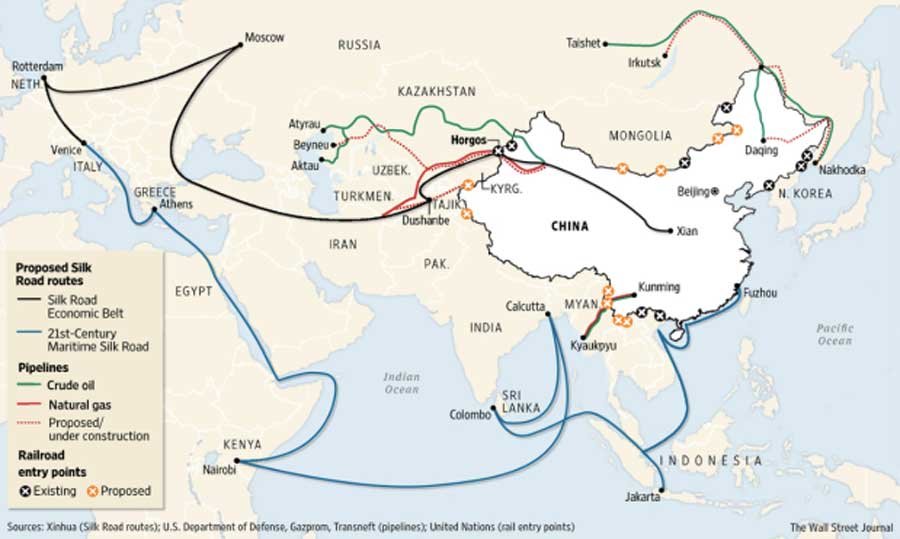The People’s Daily on May 13, 2017 confirmed the participation of US, EU, some European Countries, Japan and South Korea in Belt and Road Forum (BRF) commencing in Beijing on May 14, 2017.The last day surprise entry by US could be attributed to some commercial and economic quid pro quo, intense Chinese diplomatic efforts, and hidden agenda of US to prevent a global strategic shift by showing her presence in a forum, where 29 Head of States and delegations from over 50 countries are attending.
Japan and South Korea despite serious differences with China on security matters, have strong economic linkage and would be looking for opportunity for financial investment. Russian President’s attendance symbolizes economic linkage with China, besides protecting her interests in CAR. Other countries are looking towards infrastructure investments by China.
After Xinhua reported the list of participants, a large number of media reports and articles have appeared today, highlighting/advocating the pressure of isolation on India, by inadequate/non participation. It needs to be realized that none of these countries are being represented by their top leadership in what was declared as ‘Belt and Road Summit’ earlier, and now being referred as BRF. Each one of these countries have their own reasons to send varying level of representatives, which is mainly guided by economics, seeking commercial opportunities. None of them is confronted with an issue as serious as “Sovereignty Issue” in context of OBOR as India, with CPEC passing through Indian Territory, hence India is well justified in skipping the event.
The advantages of connectivity and economic growth have been well publicized by China. While China will like the world to believe that it is a benign connectivity project for inclusive growth of all countries connected by it, but a deeper analysis would reveal that it is a Chinese model of global connectivity, to help them in offloading trade surpluses and overcapacities, besides increasing strategic footprints by getting the global deployment capability of PLA to secure her SLOC, commercial and strategic interests, as infrastructure is a dual use facility (civil & military).
From the media reports few trends emerge out, which may impact the proceedings in next two days, which are:-
• China would be looking for more capital by selling the inclusive growth benefits of OBOR, as some of its OBOR projects got delayed due to strict capital control due to capital shortage. Even the financial institutions are not too sure of funding such costly projects. The hesitation of some of the financial institutions beyond Beijing’s control is also a factor worth consideration. The excitement and urge of Private Companies to utilize their over-capacities, and make their trade surpluses commercially profitable is understandable from business point of view, who will also be also be doing their cost- benefit analysis.
• There are some countries, which are participating but feel that their natural resources may get exploited, hence they have some reservations about it. The insecurities of some host countries, their trust deficit with respect to China, could view OBOR exploitative.
• India has been able to drive home the point that the Sovereignty Issue of POK, which is Integral part of India, is extremely sensitive, and can not be compromised. The Sovereignty Issue of POK over rides the isolation threats, commercial concerns, opportunity cost of skipping it, hence it needs to be addressed. The Foreign and Defense Ministers of India have already clarified it many times (Times of India Reports).
• It proves that India follows an independent foreign policy, to protect its core interest, even if it amounts to being absent/ insignificant representation in a large Summit like OBOR. Participation by Indian Scholars (As mentioned by Chinese Foreign Ministry Spokesman Mr Geng Shuang) cannot be assumed as Indian participation, unless appointed by Ministry of External Affairs of India.
• The presence of North Korean delegation will put the sincerity of sanctions of China on North Korea, under suspect.
• Pakistan is quite possessive about CPEC. It will be quite nervous of even a talk about any goodwill/ concession/mutual adjustment offer, which China may ever extend to India on the issues of connectivity/OBOR/CPEC. The fact that Pakistan Times mentioned of its concerns about transcript of speech of Chinese ambassador in USI of India, an Indian think tank, published in website of Chinese Embassy in India, regarding proves it.(URL attached).
• CPEC definitely gives warm water access and connectivity benefits to Western Region of China, and some economic benefits to Pakistan is well understood by all. A lot of writers in Pakistan find it exploitative leading the country towards debt trap, cost prohibitive energy and greater internal disturbances due to inequitable benefits to various parts of Pakistan. Some other countries which are participating echo similar thoughts, while some are quite enthusiastic about better connectivity.
If OBOR is viewed purely from connectivity perspective, the connectivity along most routes already exists in some form, which needs to be improved for global traffic. In case of BCIM (Bangladesh-China-India-Myanmar), India has already negotiated connectivity through Bangladesh and work is in progress. The roads in Northeastern states are being developed by India, and connectivity to Myanmar is being negotiated bilaterally, hence China driven BCIM has very little to charm India.
OBOR is a natural connectivity growth which will progress in any case, as process of natural global growth and evolution, however the synergy can make it faster. The strategic intent, increase of strategic influence by creation of this dual use facility (Civil and Military) is also worth giving a thought, as it may lead to unrestricted deployment of labor force, military force of the country creating the facility in that segment of OBOR.
In my opinion everybody attending will go along with in principle narrative of ‘Inclusive Growth’ but thereafter every single activity will have to be negotiated. India’s skipping participation in BRF, will be in tune with the principle of ‘India First’.
Reference:
- http://en.people.cn/n3/2017/0513/c90000-9214705.html
- http://www.scmp.com/business/companies/article/2084738/beijings-strict-capital-controls-are-delaying-belt-and-road
- https://www.pakistantoday.com.pk/2017/05/08/pakistan-contacts-china-over-luos-delhi-address/
- http://www.sify.com/news/india-to-skip-china-s-belt-and-road-forum-news-national-rfnnqPiacagcb.html
- http://economictimes.indiatimes.com/news/defence/china-removes-envoys-offer-of-renaming-cpec-from-speech-transcript/articleshow/58593192.cms
- http://www.fmprc.gov.cn/mfa_eng/xwfw_665399/s2510_665401/2511_665403/t1460040.shtml





